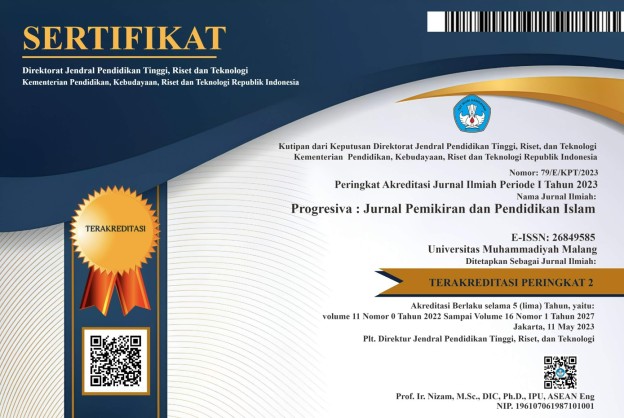Ki Hajar Dewantara's Critique of the 2022 Sisdiknas Bill: Implications for Islamic Education in Indonesia
DOI:
https://doi.org/10.22219/progresiva.v13i03.35589Keywords:
Educational Philosophy, Islamic Education, Ki Hajar Dewantara, SisdiknasAbstract
This research is a critical text study of the Philosophical Foundations contained in the Academic Text of the National Education System Draft Law (Sisdiknas Bill) which was socialized in August 2022. This philosophical study was carried out considering that the text of the Philosophical Foundations has fundamental weaknesses in it when viewed from a logical perspective. as well as Islamic spirituality, and Ki Hajar Dewantara's educational views as the founder of the educational philosophy in Indonesia with a religious and humanist character. This study aimed to explore Ki Hadjar’s thought as critics on Sisdiknas Bill and its implication of Islamic Education in Indonesia. The research questions are twofold. Firstly, what are the basic errors contained in the 'Philosophical Foundations' of the academic text of the 2022’s National Education System Bill. Secondly, what are the implications of the critics toward Islamic education in Indonesia. By using Bernadib's language philosophical method, the fundamental problems found in the 'Philosophical Foundations' text in the academic text of the 2022 National Education System Bill are uncovered. The analysis is then continued with the formulation of implications for Islamic education in Indonesia which is of concern to the majority of the Indonesia Muslim population. This research concludes there are crucial philosophical problems in 2022’s Sisdiknas Bill that could be in conflict with Islamic Education in Indonesia.
Downloads
References
Adiningsih, R. P., Muthohirin, N., & Humaidi, M. N. (2023). Analysis of Students’ Spiritual Humanism through Seyyed Hossein Nasr’s Thoughts and Its Implications for Islamic Learning. Al-Tadzkiyyah: Jurnal Pendidikan Islam, 14(2), 231–255. https://doi.org/https://dx.doi.org/10.24042/002023141940900
Azwar, B., Sirozi, M., & Sumanti, S. T. (2023). Political review of the failure of the revision of Undang-Undang Nomor 20 Tahun 2003 Tentang Sistem Pendidikan Nasional in 2023 and its impact on education in Indonesia. Inovasi Kurikulum, 21(4), 1847–1860. https://doi.org/https://doi.org/10.17509/jik.v21i4.72040
Barnadib, I. (1994). Filsafat pendidikan: Pengantar mengenai sistem dan metode. In (No Title). Andi Offset.
Bertea, S. (2005). The arguments from coherence: Analysis and evaluation. Oxford Journal of Legal Studies, 25(3), 369–391. https://doi.org/https://doi.org/10.1093/ojls/gqi020
Christopher, H. (1978). Towards a Philosophy of Administration. Oxford, Blackwell.
Dangor, S. (2005). Islamization of disciplines: Towards an indigenous educational system. Educational Philosophy and Theory, 37(4), 519–531. https://doi.org/10.1111/j.1469-5812.2005.00138.x
Dewantara, H. (1950). Pantjasila. Penerbit NV Usaha Penerbitan Indonesia.
Dewantara, H. (1967). Some aspects of national education and the Taman Siswa Institute of Jogjakarta. In Indonesia (Issue 4). JSTOR. https://doi.org/https://doi.org/10.2307/3350909
Di Basilio, G. (2022). Investigating the Relationship Between Aristotle’s Eudemian and Nicomachean Ethics. Routledge.
Digdowiseiso, K. (2009). Education inequality, economic growth, and income inequality: Evidence from Indonesia, 1996-2005. MPRA Paper, 17792. https://doi.org/https://dx.doi.org/10.2139/ssrn.1602642
Dwipratama, A. A. (2023). Study of Ki Hadjar Dewantara’s educational thinking and its relevance to kurikulum merdeka. Inovasi Kurikulum, 20(1), 37–48. https://doi.org/https://doi.org/10.17509/jik.v20i1.54416
Effendi, R. (2020). Al-Harakaḧ al-Jawhariyaḧ as Perfecting of Existence and Its Relation With Natural Sciences and Humanities. Jurnal Ushuluddin, 29(1), 71–86. https://doi.org/http://dx.doi.org/10.24014/jush.v29i1.11275
Faojin, M., Chasanah, N., & Gilani, S. I. A. (2023). Hak Pendidikan Agama Islam bagi Siswa Muslim di Sekolah Non Muslim. Amorti: Jurnal Studi Islam Interdisipliner, 15–25. https://doi.org/https://doi.org/10.59944/amorti.v2i1.74
Fox, J. (2001). Two civilizations and ethnic conflict: Islam and the West. Journal of Peace Research, 38(4), 459–472. https://doi.org/https://doi.org/10.1177/0022343301038004004
Gabriel, T. (2004). Conflict and Martyrdom in Islam. Theology, 107(839), 324–332. https://doi.org/https://doi.org/10.1177/0040571X0410700502
Grindle, M. S. (2017). Politics and policy implementation in the Third World. Princeton University Press. https://www.jstor.org/stable/j.ctt1m323qj
Hing, L. K. (1978). The taman siswa in postwar Indonesia. Indonesia, 25, 41–59. https://doi.org/https://doi.org/10.2307/3350966
Hodkinson, S. (2011). The Private Finance Initiative in English council housing regeneration: a privatisation too far? Housing Studies, 26(6), 911–932. https://doi.org/https://doi.org/10.1080/02673037.2011.593133
Jumaah, J., Mukhlis, M., & Jamaluddin, J. (2024). Konsep dan Implementasi Pendidikan Keagamaan Nonformal: Analisis Terhadap Pasal 52 RUU Sisdiknas Vesri Agustus 2022. Jurnal Ilmiah Profesi Pendidikan, 9(1), 168–175. https://doi.org/https://doi.org/10.29303/jipp.v9i1.1877
Kamaliyah, N. (2023). Analisis Wacana Kesejahteraan Guru PAUD dalam RUU SISDIKNAS 2022. Proceedings of International Conference on Early Childhood Education, 1(1), 40–46.
Khambali, K. (2024). Pendidikan Islam dalam Rancangan Undang-Undang Sistem Pendidikan Nasional Tahun 2022. Ta Dib Jurnal Pendidikan Islam, 13(1), 157–168. https://doi.org/https://doi.org/10.29313/tjpi.v13i1.13730
Kurniati, I., & Muthohirin, N. (2023). Education with local wisdom paradigm: Teaching patterns of religious tolerance in Mbawa Village Donggo District, Bima Regency, West Nusa Tenggara. Journal of Social Studies (JSS), 19(2), 201–214. https://doi.org/http://dx.doi.org/10.21831/jss.v19i2.63553
Kurniawan, K. N. (n.d.). Education as the Institutional Means Towards Postmaterialism. International Journal of Latest Research in Humanities and Social Science, 1, 9–14.
Lanjouw, P., Pradhan, M., Saadah, F., Sayed, H., & Sparrow, R. (2002). Poverty, education and health in Indonesia: Who benefits from public spending? Education and Health Expenditures, and Development: The Cases of Indonesia and Peru. Development Centre Studies, OECD Development Centre, Paris, 17–78.
Latif, Y. (2020). Pendidikan yang berkebudayaan. Gramedia Pustaka Utama.
McVey, R. T. (1967). Taman Siswa and the Indonesian national awakening. Indonesia, 4, 128–149. https://doi.org/https://doi.org/10.2307/3350908
Muthohirin, N., & Kamaludin, M. (2022). Tradition and Resilience of Religious Moderation at Pesantren of Karangasem Muhammadiyah, Lamongan. Proceedings of Annual Conference for Muslim Scholars, 6(1), 780–790. https://doi.org/https://doi.org/10.36835/ancoms.v6i1.389
Muthohirin, N., Kamaludin, M., & Mukhlis, F. (2022a). Salafi madrasas: Ideology, transformation, and implication for multiculturalism in Indonesia. Fikrah: Jurnal Ilmu Aqidah Dan Studi Keagamaan, 10(1), 81–100. https://doi.org/http://dx.doi.org/10.21043/fikrah.v10i1.14380
Muthohirin, N., Kamaludin, M., & Mukhlis, F. (2022b). Transformasi Pendidikan Islam Salafi: Implikasi terhadap Multikulturalisme di Indonesia. Proceeding Annual Conference on Islamic Religious Education, 2(1).
Muthohirin, N., & Suherman, S. (2020). Resiliensi Pesantren Terhadap Ekstrimisme Kekerasan Berbasiskan Agama dan Implikasinya terhadap Masyarakat Pesisir Lamongan. J-PAI: Jurnal Pendidikan Agama Islam, 7(1). https://doi.org/https://doi.org/10.18860/jpai.v7i1.11887
Muttaqin, T. (2018). Determinants of unequal access to and quality of education in Indonesia. Jurnal Perencanaan Pembangunan: The Indonesian Journal of Development Planning, 2(1), 1–23. https://doi.org/http://dx.doi.org/10.36574/jpp.v2i1.27
Naskah Akademik Rancangan Undang-Undang Tentang Sistem Pendidikan Nasional, 297 (2022).
Niyozov, S., & Memon, N. (2011). Islamic education and Islamization: Evolution of themes, continuities and new directions. Journal of Muslim Minority Affairs, 31(1), 5–30. https://doi.org/10.1080/13602004.2011.556886
Nor, M., & Malim, M. (2014). Revisiting Islamic education: the case of Indonesia. Journal for Multicultural Education, 8(4), 261–276. https://doi.org/https://doi.org/10.1108/JME-05-2014-0019
Rahayuningsih, F. (2021). Internalisasi filosofi pendidikan ki hajar dewantara dalam mewujudkan profil pelajar pancasila. SOCIAL: Jurnal Inovasi Pendidikan IPS, 1(3), 177–187. https://doi.org/https://doi.org/10.51878/social.v1i3.925
Reimers, F. M., & Reimers, F. M. (2020). A cultural perspective and global education. Educating Students to Improve the World, 31–52. https://doi.org/https://doi.org/10.1007/978-981-15-3887-2_3
Sahin, A. (2018). Critical issues in Islamic education studies: Rethinking Islamic and Western liberal secular values of education. Religions, 9(11), 335. https://doi.org/https://doi.org/10.3390/rel9110335
Sealy, T., Ibrahim, Z., Zulian, P. B., & Rasid, I. M. (2022). South and Southeast Asia: deep diversity under strain. Religion, State and Society, 50(4), 452–468. https://doi.org/10.1080/09637494.2022.2126258
Shajari, M., & Gozali, Z. (2014). Ibn Arabi and Molla Sadra; On Knowledge and its Role in Human Perfection. Journal of Philosophical Investigations, 7(13), 19–46.
Shogenji, T. (1999). Is coherence truth conducive? Analysis, 59(4), 338–345. https://www.jstor.org/stable/3328607
Srimulyani, E. (2007). Muslim Women and Education in Indonesia: The pondok pesantren experience. Asia Pacific Journal of Education, 27(1), 85–99. https://doi.org/https://doi.org/10.1080/02188790601145564
Srimulyani, E. (2012). Women from traditional Islamic educational institutions in Indonesia: Negotiating public spaces. Amsterdam University Press. https://doi.org/10.26530/OAPEN_418531
Stewart, H. (2021). Diversifying... Aristotle? Engaging Diverse Students with New Approaches to the Nicomachean Ethics. Teaching Ethics, 21(1). https://doi.org/https://doi.org/10.5840/tej20219395
Sukarno, I. (2016). Filsafat Pancasila Menurut Bung Karno. Media Pressindo.
Sukri, S., Handayani, T., & Tinus, A. (2016). Analisis Konsep Pemikiran Ki Hajar Dewantara Dalam Perspektif Pendidikan Karakter. Jurnal Civic Hukum, 1(1), 33–41. https://doi.org/https://doi.org/10.22219/jch.v1i1.10460
Sulaiman, A. (2023a). From Textuality To Discursity; The Hermeneutics of Quran Nasr Hamid Abu Zayd. Sophist: Jurnal Sosial Politik Kajian Islam Dan Tafsir, 5(2), 304–327. https://doi.org/https://doi.org/10.20414/sophist.v5i2.96
Sulaiman, A. (2023b). Islamic Worldview in the Perspective of MTM Yazdī and SMN Al-Attas and Their Implication on Islamization of Knowledge. Kanz Philosophia: A Journal for Islamic Philosophy and Mysticism, 9(1), 43–62.
Sulaiman, A., Azizah, S., & Hidayatullah, R. (2023). Human Ontology in Critical Pedagogy and Its Implications for Multicultural Islamic Education. Progresiva: Jurnal Pemikiran Dan Pendidikan Islam, 12(01), 1–16. https://doi.org/https://doi.org/10.22219/progresiva.v12i01.24933
Sulaiman, A., Syakarofath, N. A., & Kusmana, K. (2024). Kritik Epistemologi Islam oleh Muhammad Abid Al-Jabiri dan Implikasinya pada Islamisasi Psikologi. Academic Journal of Islamic Principles and Philosophy, 5(1), 121–146. https://doi.org/https://doi.org/10.22515/ajipp.v5i1.8556
Sulaiman, A., & Umi, S. (2023). Falsafah ‘Merdeka Belajar Kampus Merdeka’dan Implikasinya pada Strategi Belajar: Critical Synthesis Review. ZAHRA: Research and Tought Elementary School of Islam Journal, 4(1), 42–57. https://doi.org/https://doi.org/10.37812/zahra.v4i1.847
Tamansiswa, M. L. (2013). Ki Hadjar Dewantara Bagian Pertama Pendidikan. Yogyakarta. Yogyakarta: UST-Press Bekerja Sama Dengan Majenis Luhur Persatuan Tamansiswa.
Tilaar, H. A. R. (2007). Mengindonesia etnisitas dan identitas bangsa Indonesia: tinjauan dari perspektif ilmu pendidikan. Rineka Cipta.
Tsuchiya, K. (1975). The Taman Siswa movement—Its early eight years and Javanese background. Journal of Southeast Asian Studies, 6(2), 164–177. https://doi.org/https://doi.org/10.1017/S0022463400017306
Undang-Undang Republik Indonesia Nomor 12 Tahun 2011 Tentang Pembentukan Peraturan Perundang-Undangan (2011).
Wang, Y., & Guo, M. (2014). A short analysis of discourse coherence. Journal of Language Teaching and Research, 5(2), 460. https://doi.org/http://dx.doi.org/10.4304/jltr.5.2.460-465
White, B. (2016). Generation and social change: Indonesian youth in comparative perspective. In Youth identities and social transformations in modern Indonesia (pp. 1–22). Brill. https://doi.org/https://doi.org/10.1163/9789004307445_002
Woodhouse, E. J. (2007). Decision Making, Rational. In Encyclopedia of Public Administration and Public Policy (pp. 524–529). Routledge.
Zainu’ddin, A. (1970). Education in the Netherlands East Indies and the republic of Indonesia. Critical Studies in Education, 12(1), 17–82. https://doi.org/https://doi.org/10.1080/17508487009556022
Zulian, P. B. (2022). The Moderate Path of Islamic Legal Thought: The Case of Muhammadiyah in Indonesia. Quantum Journal of Social Sciences and Humanities, 3(5), 75–84. https://doi.org/10.55197/qjssh.v3i5.164
Published
How to Cite
Issue
Section
License
Copyright (c) 2024 Ode Rizki Prabtama, Ganang

This work is licensed under a Creative Commons Attribution-ShareAlike 4.0 International License.

















